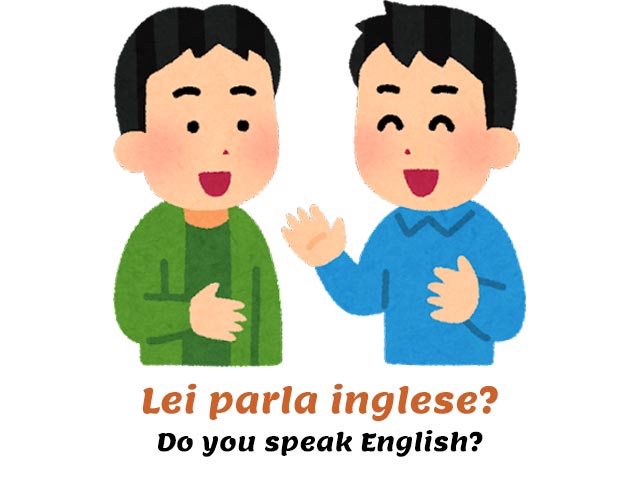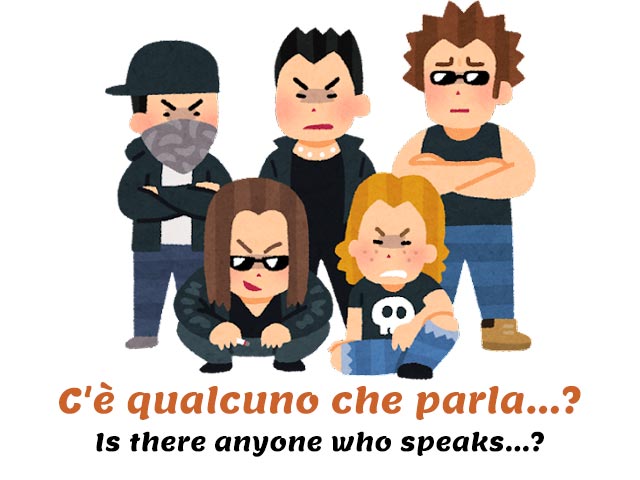How do you say it in Italian?
Parla inglese?
| Pronunciation | |
| Words you should know | Parlare (to speak) + inglese (English) |
| When to use this | With a stranger |
| When NOT to use this | With people you’re familiar with and groups |
Languages and nationalities are not capitalized in Italian.

Parli inglese?
| Pronunciation | |
| When to use this | With 1 person you’re familiar with |
| When NOT to use this | With strangers and groups |
Let’s say you’re in a crowded room and you can’t go around asking everyone if they speak your language. What should you do? There’s a specific formula you can use in both informal and formal settings.
| C’è qualcuno che parla inglese? | Is there anyone who speaks English? |
C’è is the shortened form of ci è, but you will only ever find it as c’è. Ci è is NEVER used, not even in the written language. Qualcuno translates both someone and anyone.
If you want to sound a little more polite, you can say:
| C’è qualcuno che parla inglese, per favore? | Is there anyone who speaks English, please? |
With per favore meaning please. Literally for favor.

Parlate italiano?
| Pronunciation | |
| When to use this | With a group of people |
| When NOT to use this | With 1 person at a time |
Parla inglese? … No, mi dispiace
Keep in mind that language skills vary widely throughout Italy and you may not always get a yes when you ask do you speak English in Italian.
Tourist areas may be full of people who speak a second language, but smaller villages and towns are more likely to be inhabited by older people who probably don’t speak a word of English.
If you’re traveling through the Italian countryside, it might be a while before you run into someone who speaks your language! You might hear a lot of…
| No, mi dispiace. | No, sorry. | |
| Mi dispiace, non parlo inglese. | I’m sorry, I don’t speak English. |
Sometimes, you may be asked if you speak Italian:
| Parla italiano? / Parli italiano? | Do you speak Italian? (formal/informal) |
With italiano translating Italian in Italian. Remember, nationalities are not capitalized!

You can answer with:
| Mi dispiace, non parlo italiano. | I’m sorry, I don’t speak Italian. |
But wait, maybe you speak a third language!
If you want to ask any person if they speak a certain language, you can use the Parla…? formula we saw earlier on and add any language from this list:
- spagnolo (Spanish)
- tedesco (German)
- francese (French)
- cinese (Chinese)
- russo (Russian)
- arabo (Arabic)
| Parla arabo? | Do you speak Arabic? (polite) |
Parlare arabo and parlare turco (speak Turkish) are popular Italian expressions that mean to be impossible to understand.
If someone tells you that you parli arabo, it means they don’t understand a single word you’re saying!
| Parlate tedesco? | Do you speak German? (plural) |
| Parli cinese? | Do you speak German? (informal) |
That’s the end of our lesson, now you know everything you need to know to ask do you speak English in Italian. Don’t be shy and ask away: we love to have a good chit-chat with foreigners, and if we really can’t find a common “spoken means of communication”, we can always speak with gestures! 😉
More free Italian resources
You might want to keep learning Italian online with these free Italian resources:
❤️ If you liked this lesson on how to say do you speak English in Italian, share it with your friends!


